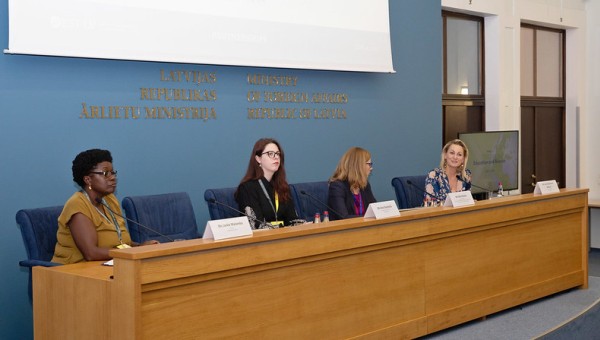A Liberal Arts Approach to Business: Director Silvia Carnini Pulino
An Italian-Argentine national, Professor Silvia Carnini Pulino holds an M.B.A. from the Harvard Graduate School of Business and an M.A. from the University of Oxford. She has 20 years of experience in international business, with a strong focus on entrepreneurship and innovation. Professor Pulino joined the JCU Business Administration Department in 2002, and she was recently appointed Director of the Frank J. Guarini School of Business. In May of 2022, the School received accreditation from the Association to Advance Collegiate Schools of Business (AACSB), thus placing it among the world’s leading business schools.
Tell us about your background.
I started my career in investment banking, which gave me a very solid grounding in numbers and data, enabling me to have a full picture of any business situation. I then had the opportunity to teach finance at John Cabot University, and that was the beginning of a love affair that has not ended yet. At John Cabot I have covered many positions, I was chair of the Business Department for about five years, and I founded and developed the Institute for Entrepreneurship. Before that, I structured the Career Services center.

Professor Silvia Pulino, Director of Frank J. Guarini School of Business
What does your position as Director of the Frank J. Guarini School of Business entail?
The Director’s role is very different from teaching or establishing the Institute for Entrepreneurship, in the sense that it is much more people oriented. My top priority is, of course, to maintain accreditation with AACSB, which requires a lot of administrative work. However, equally important and perhaps much more satisfying is the idea of setting the strategy for the School of Business, and then aligning and empowering faculty behind it. We have a lot of talent in the Departments of Business Administration and Economics, and capturing some of that talent to develop new initiatives is a beautiful thing. The role is also about empowering students to develop the best version of themselves, and I believe this is the distinctive factor of the School of Business at John Cabot.
We are a liberal arts university and that means that students have the opportunity to discover their purpose in life, and then develop it through many different experiences. I think that is the fundamental role of the university in young people’s lives: understanding how unique they are and then tailoring their future career according to what’s going to give them the deepest satisfaction and gratification as a valuable member of society.
One of the Business School challenges going forward will be to fully incorporate technology in the scope of a liberal arts curriculum.
Tell us about the AACSB accreditation process.
The accreditation process is brutal, in the sense that you are really turned inside out by people who are very knowledgeable and have a very clear idea of what are the key success factors for a School of Business.
The process lasted for about five years and, the good thing about it is that it got us very, very focused. It helped us improve some areas that we had not necessarily paid enough attention to before, and has made us much stronger in terms of the overall structure of the University, the governance of the School of Business, and the curricular offer. It also led us to a deeper understanding of the connections among faculty, students, alumni, and the wider business and even governmental community.
How does the School of Business benefit the JCU community?
Our rare liberal arts approach to business means that we believe in interdisciplinarity, in connecting with other parts of the University, and we have been doing that for as long as I can remember, well before we even started the AACSB accreditation process. We have taught joint classes and organized joint lectures on topics like digital humanities, for instance, with the English Department. We are working with the Art and Design Department to leverage and develop the connection between creativity and entrepreneurship. We are also working with the History and Humanities Department on the ethics of new technology and the ethics of AI. Another important service to the university as a whole is provided by the Institute for Entrepreneurship, which helps students develop an entrepreneurial mindset as a tool for life.
We are also working towards making sustainability one of our flagships, connecting the various parts of the University that act in that domain, so that we can achieve systemic efficiency and maximize impact. I have been working closely with Professor Michèle Favorite, who is the lead person on sustainability at the School of Business.
We are also working towards building a culture of academic pursuit, not only among faculty but also among students. We are beginning to see some instances of students publishing in academic peer-reviewed journals and we want to see that grow, as it provides a fantastic experience and is also a great business card for those wishing to pursue graduate studies.
Another important area of development is the funds we are making available to the entire University for interdisciplinary projects; this helps bring the academic community together and pushes the innovation frontier.
What’s a book that you’ve recently read that you recommend?
I highly recommend Beginners by Tom Vanderbilt. It is about the joy and the transformative power of lifelong learning. Putting yourself in the position of being a beginner does wonderful things to your brain and increases the satisfaction that you derive from life.





